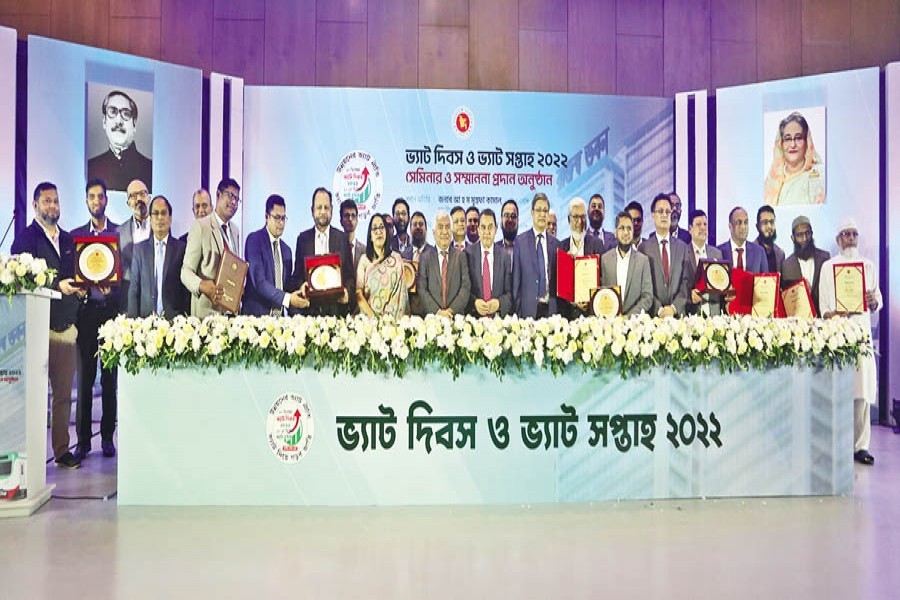The revenue authority would take steps carefully to reduce tax rates to facilitate industrial growth in Bangladesh, alongside increasing collection for development financing.
Also, the revenue board has moved to increase manpower and is working with the Public Administration and the Ministry of Finance in this regard, NBR Chairman Abu Hena Md Rahmatul Muneem said Saturday at a business meet, where the finance minister urged joint efforts for enhanced revenue mobilisation.
"The NBR is discussing with the businesses the steps to implement those through mutual understanding," the board chief added.
A major suggestion came for ending dependence on a single source-tobacco industry -- for most collection of value-added tax (VAT).

The function was held in the city in connection with observance of the VAT Day 2022.
The head of the country's apex trade body, speaking at the same event, expressed displeasure over "harassment" of businesses by taxmen. He felt that tax officials should take into consideration the ground realities, not the tax- collection targets, while dealing with businesses.
Finance Minister AHM Mustafa Kamal, who attended the function as chief guest, called upon the taxpayers and taxmen to join forces in making the country's tax-collection growth sustainable.
He praised the taxpayers for their contribution that was enabling the government to invest in development for the underprivileged community.
He said a team of the development-partner International Monetary Fund (IMF) during its recent visit also praised Bangladesh's achievement in economic and per- capita income growth as "outstanding".
Dr Shahidul Islam, member of the VAT wing of NBR, delivered the welcome speech at the function while Zakia Sultana, member of the VAT-policy wing, presented the keynote paper.
The NBR handed over awards to nine top VAT payers at the national level at the programme.
In his concluding remarks, NBR Chairman Abu Hena Md Rahmatul Muneem also vowed to maintain the revenue-collection growth that was 21 per cent in the last fiscal year and was continuing at the rate of 16 per cent in the current fiscal year.
He believes fiscal support might be narrowed down after Bangladesh's graduation from the least-developed country (LDC) status and enhancement of capacity of the local industry.
"The revenue board would support the local industry to manufacture more value-added products to promote the 'Made in Bangladesh' brand," he told the business audience.
Federation of Bangladesh Chambers of Commerce and Industry (FBCCI) President Md Jashim Uddin said the taxmen should trust the taxpayers and sit with the business community to explore ways to increase revenue collection.
"Taxmen should not create panic by seizing documents, blocking vehicles or harassing taxpayers," he said.
He made it clear that the FBCCI is not with the tax- evaders dodging payment of tax wilfully.
He also said the taxmen needed to work on the basis of reality instead of imposing tax burden on businesses to meet their targets.
The FBCCI chief sought scope to adjust source tax with the actual payable taxes. He also laid more emphasis on automation and tax breaks for the green industry, recycling industry and backward-linkage industry.
In the keynote paper, Zakia Sultana said the NBR should come out of its dependence on a single source, tobacco, for revenue collection.
She said the VAT-automation system contributed to a rise in the number of registered businesses to 440,000 under the VAT net.
Some 84 per cent of the VAT payers submitted their return online.
"VAT collection at the retail level is a challenge for NBR," she said.
The NBR outsourced the Electronic Fiscal Device (EFD) installation for VAT collection from retail businesses, she noted.
So far, about 8,400 EFDs have been installed for this purpose. The EFDs are connected to the central server of the NBR.
Ms Sultana said around 50 per cent of the revenue came from source taxes thanks to efforts.
Representatives of the top VAT- paying companies who received the awards include Tanvir Ali, Executive Director of Olympic Industries Limited, Prof Dr AKM Sadrul Islam, Managing Director of Ibne Sina Pharmaceuticals Industries Limited, and Abul Bashir, Chief Financial Officer of SMC Enterprise Limited.
The representatives also include Md Raihan, Chief Executive Officer of Walton Plaza, Muallem A Choudhury, Director of Aagora Limited, and Mostak Ahmed, chief financial officer of Unimart Limited.
The others are Kamal Syful Qadir, chief executive officer of bKash Limited, Mohammad Shah Alam Sarwar, managing director and CEO of International Finance Investment and Commerce Bank Limited, and Mohammad Aminul Huq, Chief Executive Officer of Nagad Limited.


